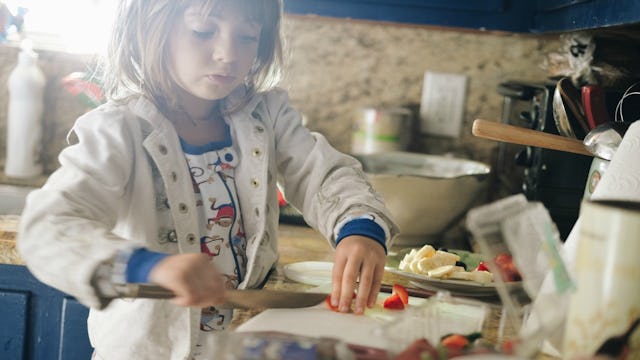Why We Should Be Less Involved Parents

I hear my kids arguing heatedly upstairs. Maybe full-on fighting, who knows; there are a few thumps and thuds. I know this means one of two things: Either in the next few seconds, someone will hurtle down the stairs whining, “Mo-omm!” … or they’ll work it out on their own.
As it turns out, working it out is exactly what they do, and peace is restored as fast as it was disturbed. The most difficult part of this scenario is sitting back, choosing not to intervene, and trusting in their ability to fix the problem without me — but more often than not, being less involved is the best thing I can do.
I’m not gonna lie and say my kids never tattle on one another (because hello, kids), but more often they resolve their own conflicts – only because they know by now that I’m in no hurry to jump in and do it for them. They know that sometimes even if they do run to me for mediation, I just shrug my shoulders and say simply, “Figure it out.” They whine about it, of course, but do it anyway, because I’ve taken away their option of shifting that burden to someone else.
It’s my job as a parent to offer guidance. But “guidance” doesn’t mean doing things for them that they need to learn to do on their own. It means nudging them in the right direction when they need it, not picking them up and carrying them down the path I think they ought to be on.
I don’t decide what my children play or who they play it with, or what they draw, or what they wear, or what they want for lunch. Those are decisions that they’re well-equipped to make for themselves, so why shouldn’t they? Learning doesn’t happen through osmosis; it happens through trial and error, through success and failure, through experience. And if I don’t allow them that experience, if I always insist on injecting myself into the solution before they have a chance to attempt something on their own, then I’m crippling them – despite my best intentions to do the opposite. I won’t always be able to be there for them, and I’ve got to equip them to figure things out independently.
It’s like tying your kid’s shoes every day, even after he’s physically capable of doing it himself. He’s going to automatically expect you to tie them. He won’t know how to do it himself. And one day, playing on the playground, his shoe’s going to come untied and he will be embarrassed that he’s the only one of this friends that doesn’t know how to tie. Pointing! Laughing! Bullying! Therapy!
Okay, maybe I’m being a little dramatic. But the point is, when I loosen the reins, everybody wins: My kids develop a sense of autonomy and the self-confidence to know that they can handle things, and I don’t have to worry so much about them. I don’t have to waste valuable time dictating stuff they can (and should) take care of, and they don’t have me breathing down their necks. This doesn’t mean I check out completely and watch YouTube videos while they play with knives. It means I choose more carefully when it comes to my involvement.
Do I genuinely need to step in, for safety or otherwise, or is it just my compulsion to hover, my “mother knows best” attitude? If the answer is the latter, I stay out of it. Less involved equals more opportunity for my kids to grow.
It’s hard to step back and let them learn the lessons in their own sometimes difficult, messy way, especially if you’re the kind of person who likes to be in control (not that I’d know anything at all about being a control freak … ahem). It can be gut-wrenching, but my role as their mother is not to make my own life easier, or to put my comfort above theirs. I’m here to make sure my children are given the opportunity to experience life – even the rockiest moments – firsthand, because that’s the best way for them to discover how to navigate through.
And that’s a gift I can give them, even if it doesn’t always look like one from where I’m sitting. On the couch. Minding my own business while they learn to work things out.